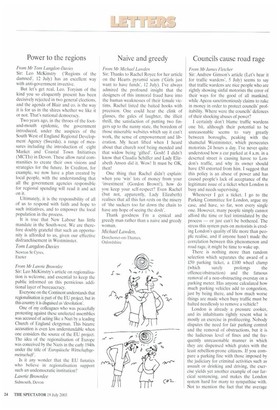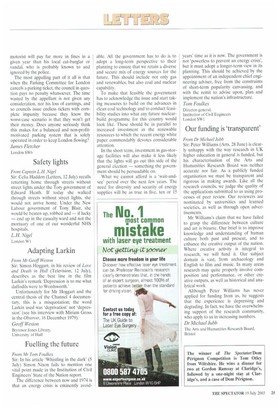Councils cause road rage
From Mr James Fletcher Sir: Andrew Gimson's article (Let's hear it for traffic wardens', 5 July) seems to say that traffic wardens are nice people who are rightly showing sinful motorists the error of their ways for the good of all mankind, while Apcoa sanctimoniously claims to rake in money in order to protect councils' profitability. Where were the councils' defences of their shocking abuses of power?
I certainly don't blame traffic wardens one bit, although their potential to be unreasonable seems to vary greatly between boroughs, peaking with the shameful Westminster, which persecutes motorists 24 hours a day. I've never quite understood how a car parked at 4 a.m. in a deserted street is causing havoc to London's traffic, and why its owner should have £50 extorted from him. I suggest that this policy is an abuse of power and has caused people's lack of acceptance of the legitimate issue of a ticket when London is busy and needs supervising.
Whenever I get a ticket, I go to the Parking Committee for London, argue my case, and have, so far, won every single one. However, many people simply cannot afford the time or feel intimidated by the process — or just can't be bothered. The stress this system puts on motorists is eroding London's quality of life more than people realise, and if anyone hasn't made the correlation between this phenomenon and road rage, it might be time to wake up.
There is nothing more than random selection which separates the award of a £50 parking ticket. a £100 wheel clamp (which surely prolongs the offence/obstruction) and the fatuous removal of a non-obstructing overstay on a parking meter. Has anyone calculated how much parking vehicles add to congestion, just by being there, and how much worse things are made when busy traffic must be halted needlessly to remove a vehicle?
London is already a pressure cooker, and its inhabitants rightly resent what is mostly an exercise in profiteering. Nobody disputes the need for fair parking control and the removal of obstructions, but it is the ludicrous level of fines and the frequently unreasonable manner in which they are dispensed which grates with the least rebellion-prone citizens. If you compare a parking fine with those imposed by the judiciary for criminal activities such as assault or drinking and driving, the exercise yields yet another example of our farcical sentencing, and makes the London system hard for many to sympathise with. Not to mention the fact that the average motorist will pay far more in fines in a given year than his local cat-burglar or vandal, who is probably known to and ignored by the police.
The most appalling part of it all is that when the Parking Committee for London cancels a parking ticket, the council in question pays no penalty whatsoever. The time wasted by the appellant is not given any consideration, nor his loss of earnings, and so councils issue endless tickets with complete impunity because they know the worst-case scenario is that they won't get their money. Does anyone seriously think this makes for a balanced and non-profitmotivated parking system that is solely operated in order to keep London flowing? James Fletcher
London SW6



























































 Previous page
Previous page